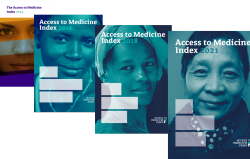Diagnostics companies
Lack of access to diagnostics costs lives
Diagnostics and monitoring devices are an essential element of the health system and a critical part of the continuum of care. Whether performed on blood, tissue or other patient samples, diagnostic tests are a vital source of information for healthcare providers and patients. They help determine which treatments are needed and can be used to monitor and manage disease.
In developed markets, diagnostics form an integral part of decision-making at every step along the care pathway. However, in low- and middle-income countries, diagnosis remains one of the weakest links in the care cascade, leading to unnecessary suffering and deaths. This discrepancy became abundantly clear in the COVID-19 pandemic, with high-income countries having testing rates for SARS-CoV-2 ten times higher than low- and middle-income countries.
The diagnostics sector is highly fragmented, and there is a lack of joined-up strategy for improving the availability of diagnostics in lower-income countries. This results in gaps in supply and access across multiple therapeutic areas, including infectious diseases, maternal and neonatal health, and noncommunicable diseases such as diabetes and cardiovascular disease.
It is time to realise the potential of diagnostics for global health
Diagnostics companies play a critical role in providing patients with a comprehensive spectrum of care. In many therapeutic areas, such companies hold the key to increasing access to scientific innovation in low- and middle-income countries.
There are four key areas where diagnostics companies can step up to improve access to medicine:
Invest in global health R&D to adapt existing technologies to the needs of low- and middle-income countries and plan ahead for access to new technologies
Secure manufacturing capacity and quality at multiple global sites to ensure supply
Prioritise underserved populations and ensure diagnostics are available to all, from large organisations to individuals paying out-of-pocket
Facilitate diagnostic capacity building by supporting local experts in the use and maintenance of equipment
How we work to improve access to diagnostics
At the Access to Medicine Foundation, we work to incentivise diagnostics companies to do more to make their technologies and products available for people living in low- and middle-income countries. We have been engaging with several diagnostics companies for a number of years already in the context of our Access to Medicine Index and are currently expanding our work in this sector.
We engage strategically in the diagnostics space to deliver the maximum impact. Although the diagnostics sector is fragmented overall, several important therapeutic areas are dominated by a few key players. This provides an opportunity to apply our tried-and-tested model to spur large companies to make steps towards improved access.
By forging constructive partnerships with local and global players, we can unlock the potential of diagnostics for all.

